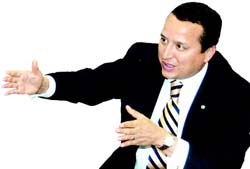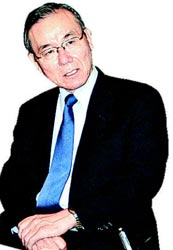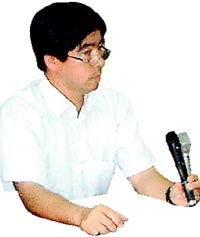Working at the United NationsWorking together for peace on a world stage
When an international conflict occurs, how should the international community handle it? When aid is provided to developing countries, who should be involved and how should it be done? To take charge of such issues, there is an international organization, the United Nations (UN). For this issue, we look at the lives of UN workers.
Some UN workers are busy in the field visiting areas suffering conflict or damaged by disaster. One recalled, "I went all over to help deliver humanitarian aid." Hiroshima has a UN entity, too, the United Nations Institute For Training and Research (UNITAR). Alexander A. Mejía, head of the UNITAR Hiroshima Office, told us about the significance of this organization in Hiroshima, saying, "From here, we can deliver messages of peace to the world."
We asked them what we should do in our youth in order to work for the international community in the future. Many of them told us that, in addition to learning languages, it is important to develop a mind that understands different cultures and different ways of thinking.
Becoming a UN staff member: Be disciplined and study English hard
We interviewed Kazuko Yokoyama, 55, a professor at Toyo Gakuen University who once worked at the UN, and asked about the UN system and how young people can become UN staff members in the future.
The United Nations consists of six main organizations including the General Assembly, the Security Council and Secretariat. Organizations established by the General Assembly include the World Food Programme (WFP) and the Office of the United Nations High Commissioner for Refugees (UNHCR). As to specialized agencies independent from the UN, there is the Food and Agriculture Organization (FAO) and World Health Organization (WHO), among others. All these organizations and agencies make up the "United Nations System," 31 entities in all.
As of the end of December 2007, 25,562 people were at work at these 31 organizations. The largest proportion of staff members are from the United States. The number of Japanese staff stood at 660. Although the number of staff from each nation is determined by the level of their UN contributions, and Japan ranks second after the United States in this regard, it ranks 7th in terms of UN staff.
Some paths toward landing a job at the United Nations include taking the National Competitive Recruitment Examination, applying for a vacancy, or being transferred from the Japanese government.
To work at the UN, at least a master's degree is needed. Compared to American and European staff, more Japanese staff earn their master's degrees after first working at ordinary companies. The language used with greatest frequency within the UN is English. For Japanese staff, it can be difficult to find a job that makes good use of their UN experience after working there for a decade or so. This is regarded as one reason why there are comparatively few Japanese staff members at the UN.
Professor Yokoyama says that having discipline is an important trait for young people who wish to work in the international community in the future. English must be mastered and care should be taken in choosing a graduate school. She also recommends that young people gain experience abroad by taking part in overseas study tours. (Aoi Otomo, 15)
| From Hiroshima to the world, training for reconstruction Alexander A. Mejía, director of the UNITAR Hiroshima Office |

|
| Mr. Mejía discusses the activities of the UNITAR Hiroshima Office. (Photo by Masahiro Mikoshi, 16) |
| Click to view our interview with Mr. Mejía. |
The United Nations Institute for Training and Research (UNITAR) is the only UN organization in Hiroshima. Head of the UNITAR Hiroshima Office, Alexander A. Mejía, 42, was appointed from more than 60 applicants and arrived in Hiroshima in October of this year.
"The missions of the UN are designed to build and preserve peace," said Mr. Mejía. The UNITAR Hiroshima Office has been engaged in providing training for Afghan government officials and in researching the conservation of World Heritage sites. He explained the significance of the UNITAR office in Hiroshima, saying, "Hiroshima was the first city in the world to suffer a nuclear attack and then be reconstructed. This site is the ideal place to convey the message of peace through the development of human resources."
Mr. Mejía was a diplomat in his native country, Ecuador. But he wanted to know more about the world so he decided to work for the UN. While serving as a diplomat, he was also a university professor, and this teaching background is why he joined UNITAR. Before coming to Hiroshima, he was posted in the U.S. city of Atlanta for four years.
When Mr. Mejía was in junior high school, he learned about Hiroshima. Recalling that experience, he said, "It was such a tragedy that the students in my class were speechless." He believed he could learn many things by seeing firsthand how Hiroshima was reconstructed and so he applied to be the director of the UNITAR Hiroshima Office.
Ecuador was in conflict with its neighbor Peru for almost 50 years, from 1941 to 1995. As a child, he was taught that "Peruvians are the enemy so stay away from them." However, when he visited Lima, the capital of Peru, he found that the Peruvian people spoke Spanish, too, his own mother tongue.
At the end of our interview, Mr. Mejía gave us this advice: "People can learn a lot from each other as we all have different ways of thinking and behaving and different cultures. By doing so, you can find new things about yourself. Curiosity is vital to making your dreams come true. No one has ever found success without curiosity." (Shiori Kosaka, 14)
| "I would go anywhere" Kenzo Oshima, former UN Under-Secretary-General |

|
| At a hotel in Hiroshima, Kenzo Oshima shares his experience of working at the United Nations. (Photo by Chisa Nishida, 15) |
Kenzo Oshima, who was born in the city of Hiroshima, is a former UN Under-Secretary-General for Humanitarian Affairs and Emergency Relief Coordinator. Beginning in 2001, he facilitated the aid work for countries suffering from natural disaster or conflict for two and a half years.
When an emergency arises, many aid organizations rush to the site where relief is needed. To prevent chaos, he would assign each aid organization to a particular place to undertake its work. He was also in charge of funding for aid organizations and efficient support for the relief efforts.
Whenever serious difficulties occurred, he would go directly to the scene. He was on the road about 35% of the time, including to such war-torn countries as Afghanistan and Sudan.
In the midst of a conflict, Mr. Oshima would call on the parties involved to respect a cease-fire of 48 hours so relief aid could be safely delivered and for guerrillas not to enter refugee camps. He says that even terrorist groups can be cooperative in regard to humanitarian aid, to some extent. At one point, he had a memorable meeting with a Taliban leader. "When I was needed, I would go anywhere to meet anyone," he remarked.
After the Chernobyl nuclear power plant disaster, he served as the UN Coordinator of International Cooperation. When he visited the area in 2002, the plant had become off limits and wild boar and deer were wandering through the overgrown foliage.
Mr. Oshima was exposed to the atomic bombing of Hiroshima when he was two years old. His mother was killed in the blast. Based on this experience, he made strong efforts to see local governments increase their support for victims of radiation. "I found the governments of Russia, Ukraine and Belarus all cooperative because they knew I was an atomic bomb survivor," he recalled. (Masahiro Mikoshi, 16, and Aoi Otomo, 14)
| Providing accurate information, with care Yasuhiro Ueki, UN public relations officer |

|
| Yasuhiro Ueki delivers a statement to the press about humanitarian aid to victims of the tsunami in Aceh, Indonesia. (Photo courtesy of the UN Information Center) |
The UN also has public relations officers. They work to communicate the activities of the UN and their importance. Yasuhiro Ueki, 55, is based at UN Headquarters in New York, though at times he heads into the field to convey information in his capacity as public relations officer.
When Mr. Ueki was studying at Colombia University in the United States, he had a chance to meet Yasushi Akashi, the very first Japanese UN staff member and, on Mr. Akashi's recommendation, began working at the UN.
The main role of public relations officers is to draw the world's attention to particular issues. For instance, for a campaign about peace in the Middle East, including the problem of Palestine, they hold seminars for the media of each nation and offer training for Palestinian journalists.
For Mr. Ueki, his most difficult assignment involved the nuclear inspection in Iraq that took place from November 2002 to March 2003. This was at a time when the possibility of war between Iraq and the United States and allied nations was looming large.
Mr. Ueki was making announcements almost every day and responding to the media at press conferences and in interviews. The public relations officers, were unable to divulge much information, though, for fear of tipping off terrorist groups to the location of weapons of mass destruction. At one point, he made some misguided remarks and his boss scolded him not to speak so openly.
"The main mission of the United Nations is to protect civilians during conflict," Mr. Ueki explained. He feels he did his best to release accurate information, and as a result, he was asked by the Iraqi side to deliver information through the UN because Iraq's information was regarded as unreliable. (Masaya Obayashi, 13)
| University students join UN activities: Holding English lessons and conducting research in Kyrgyzstan |

|
| Akemi Ashida with children in the hospital in Kyrgyzstan. (Photo courtesy of Kwansei Gakuin University) |
University students can take part in UN activities in the field. Kwansei Gakuin University has an agreement with United Nations Volunteers (UNV) to send students to developing countries. Since 2004, 50 students have participated in the program.
Akemi Ashida, 23, in her fourth year in the School of Policy Studies, went to a hospital in Kyrgyzstan in central Asia and taught English there for four months from July 2008. Her students ranged from doctors to hospitalized children. She divided the students into classes according to their reading and writing ability in English, then held lessons.
Akemi joined the program because she had longed to work abroad since she was a high school student. Then, when she was in her second year at college, she met a Japanese member of the UN staff at a seminar at UN Headquarters in New York and received the advice: "You should get to know the field." She says that her experience in the program helped her draw a clearer picture of UN activities. "I want to find a job that's right for me," she remarked. "I would be really happy to get a job at the UN."
Haruka Taniguchi, 22, also in the School of Policy Studies, was sent to Kyrgyzstan, too. She stayed there for three months, working with the NGO "Save the Children." She interviewed staff of the United Nations Children's Fund (UNICEF), local government officials, and doctors and mothers, and with the data she collected, made a report. "For me," she says, "the UN was somewhere far away from me. But through this experience, I felt I was able to move a half-step forward to working there." (Seira Furukawa, 16, and Chisa Nishida, 15)